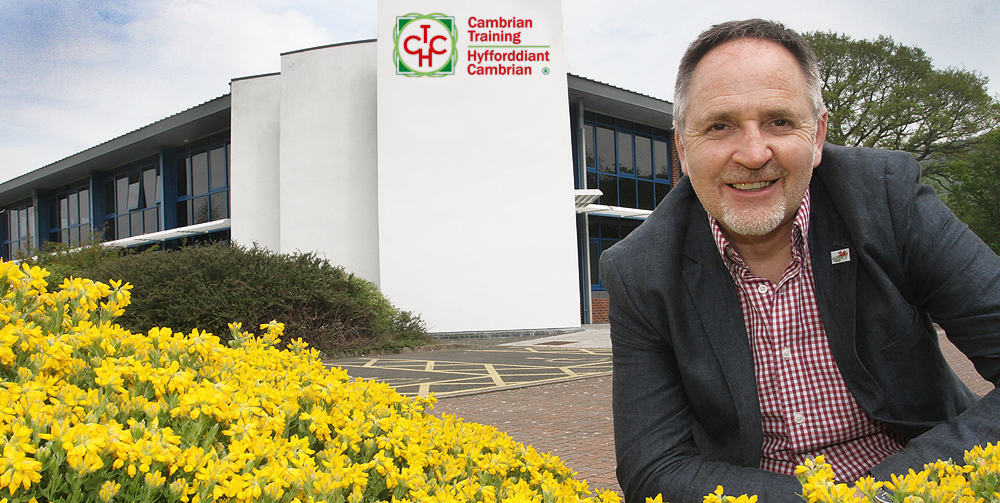
By Arwyn Watkins, OBE, managing director of Cambrian Training Company and president of the Culinary Association of Wales.
Most people will now be aware of the recruitment crisis in several sectors of the economy both here in Wales and across the UK. The shortage of lorry drivers has been dominating the headlines lately, but the hospitality industry was grappling with a diminishing number of staff even before the Covid-19 pandemic locked down the UK.
I am passionate about the hospitality industry which is understandable as I began my career as an apprentice chef in the Army. Earlier this year, Cambrian Training Company took the bold step of opening Chartists 1770 at The Trewythen, a restaurant with seven rooms in the historic Mid Wales market town of Llanidloes. The new business employs 16 full and part-time staff, including six apprentices.
From personal experience and from speaking to hospitality businesses with which we work across Wales, I am acutely aware of how difficult it is to recruit staff. Let me say from the outset, there are no easy fixes for this recruitment crisis.
For too many years, hospitality businesses and other sectors of the economy have been over-reliant on workers from European countries. Now, as a result of Brexit and the impact of the pandemic, these economic migrants are no longer available to businesses.
I believe the long-term solution rests with the compulsory education system here in Wales and across the UK. For more than a decade, the work-based learning sector in Wales has been campaigning for apprenticeships to have parity of esteem with degrees. But our words have fallen on deaf ears.
Our education system currently encourages the most talented, productive children to aspire to attend university whilst apprenticeships are often considered a second option. This results in many talented young people going to university and achieving degrees unrelated to the needs of the economy. This must change so that our education system, from primary school upwards, is linked to the future needs of our economy.
How are children currently made aware of the opportunities in the hospitality industry and other sectors? The answer is, they are not and that must change. As in industry, we must be allowed to engage children from primary school age upwards.
Minister for the Economy Vaughan Gething has said that we must do everything we can to retain our children in Wales, yet our education system is doing the exact opposite. We are exporting our talent to universities outside of Wales and how many return to work here? There is a human resource drain.
That policy might have been fine in the past because there were other options available to businesses in the form of economic migrants. That option no longer exists.
Every hospitality business needs to have a conversation with their politicians, both in Wales and across the UK. We cannot continue to operate in an economy where 50 per cent of our most talented individuals are encouraged into higher education, taking them out of the workforce for at least three years.
Changing this system is not going to win votes but meeting the needs of the economy is far more important to the country than votes. The UK and Welsh Governments can begin by making children aware of the rewarding career opportunities available in the hospitality industry, which sadly is not held in the same esteem here as in other European countries.
There is no workforce riding over the hill to rescue us. Long term, we have to learn how to attract people into the hospitality industry, how to treat them when they in our businesses and how to value and retain them.
We also need to learn how to engage with our local communities because our workforce of the future is going to come from within our communities, not from outside. It’s about time that those of us who either work in or enjoy the industry started valuing careers within it for our own children. Unfortunately, there are currently not enough people who consider hospitality as a rewarding career which is a perception we in the industry must change.
Businesses need take a long, hard look at themselves to analyse if they are doing everything they can to create the right working environment for their staff. If an individual chooses to stay in Wales to develop their career, then we have a duty as employers to create opportunities for them.
The world has changed since the pandemic began and employees now, understandably, expect a good work-life balance. The industry must respond by creating opportunities for flexible working hours which many businesses are already doing.
However, we cannot avoid the harsh reality that some employers have suffered reputational damage in their local community as a result of the way they have treated their employees. That is not something that can be resolved overnight but these employers must change the way they operate or get out of the industry. Hospitality is a unique industry that is hugely important to Wales, which has been proven over the past 18 months.
I have mentioned at length the need for change which will have costs attached. Will consumers be prepared to pay more for hospitality services in the future, which is the inevitable consequence of the rising cost of food, labour, fuel and taxation?
Ultimately, the consumer is going to have to pay more for everything. Will that become the breaking point for occupancy rates going down, making businesses financially unviable with less jobs, less tax for the Exchequer and more people unemployed? Only time will tell.





